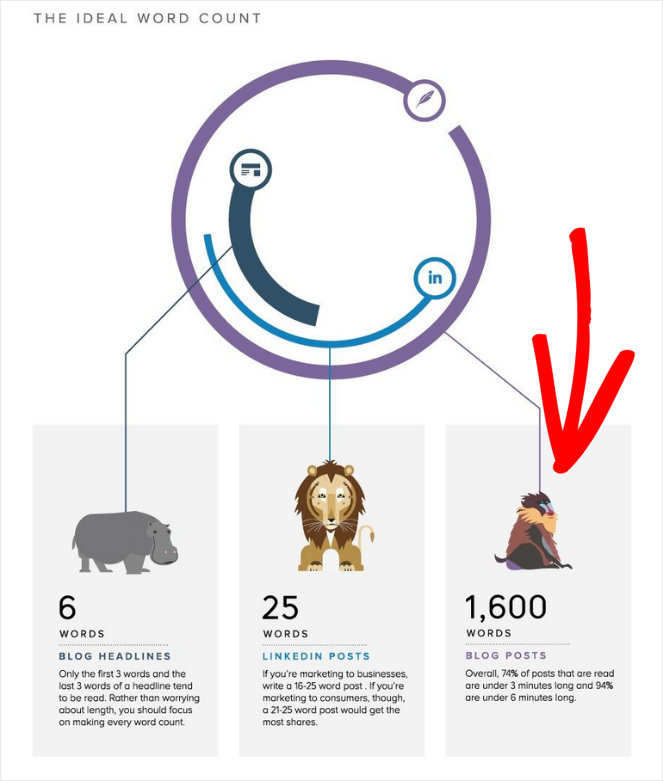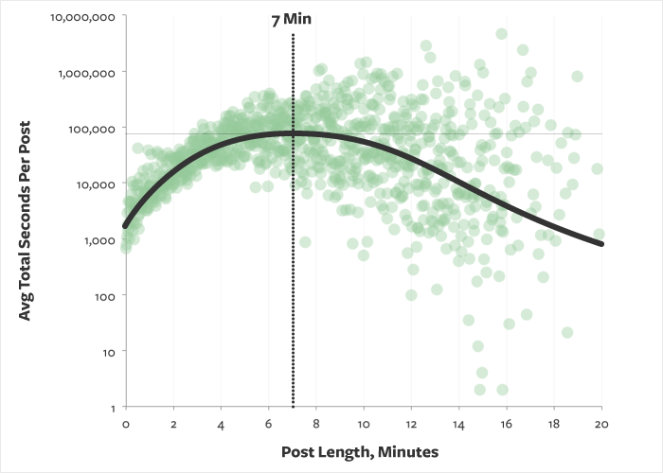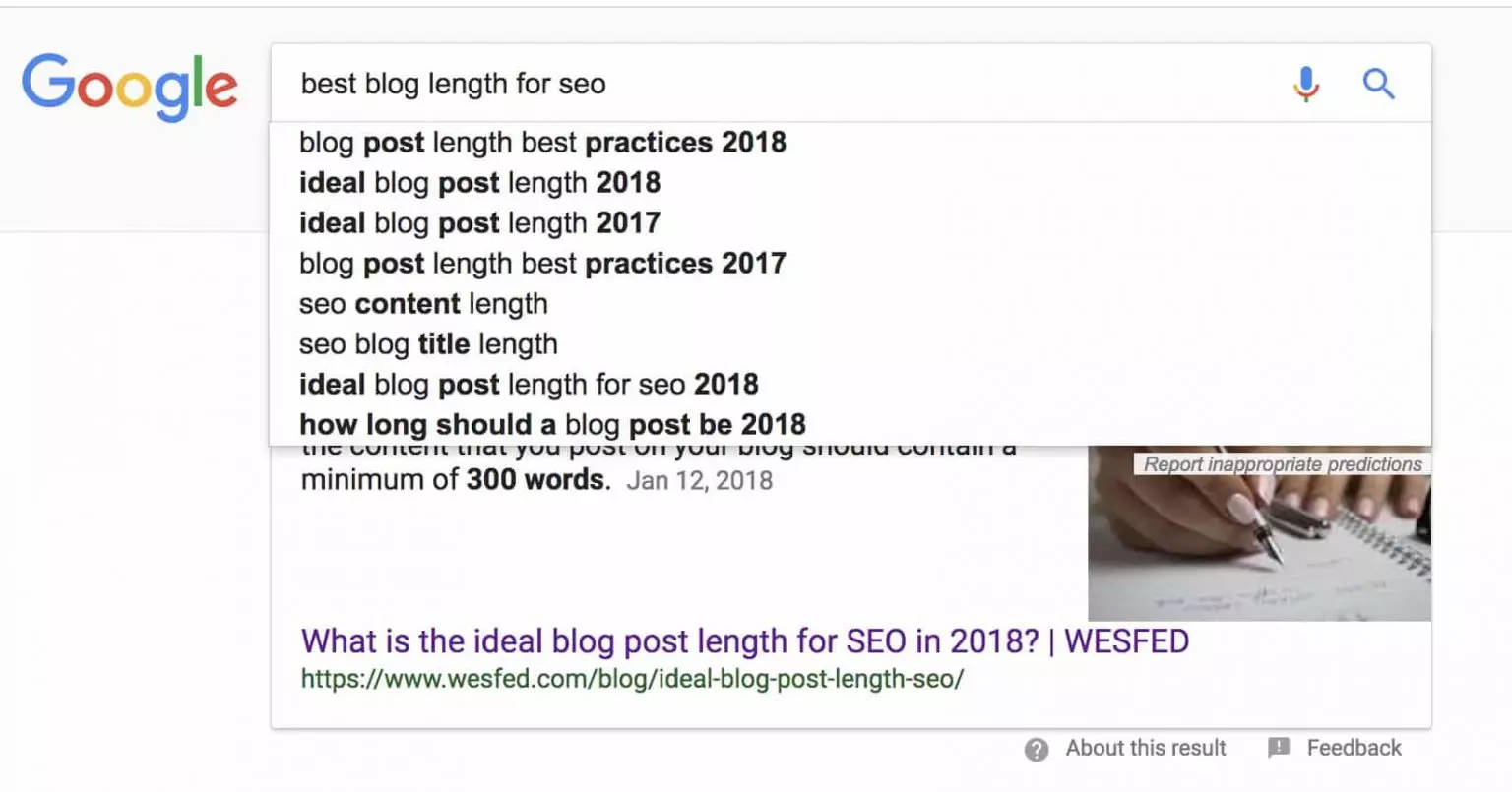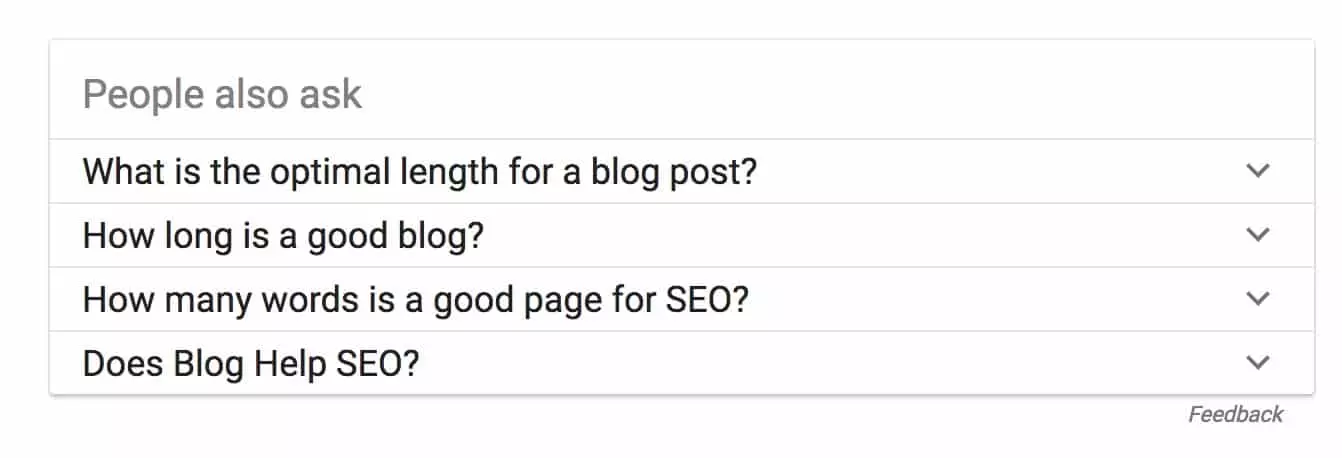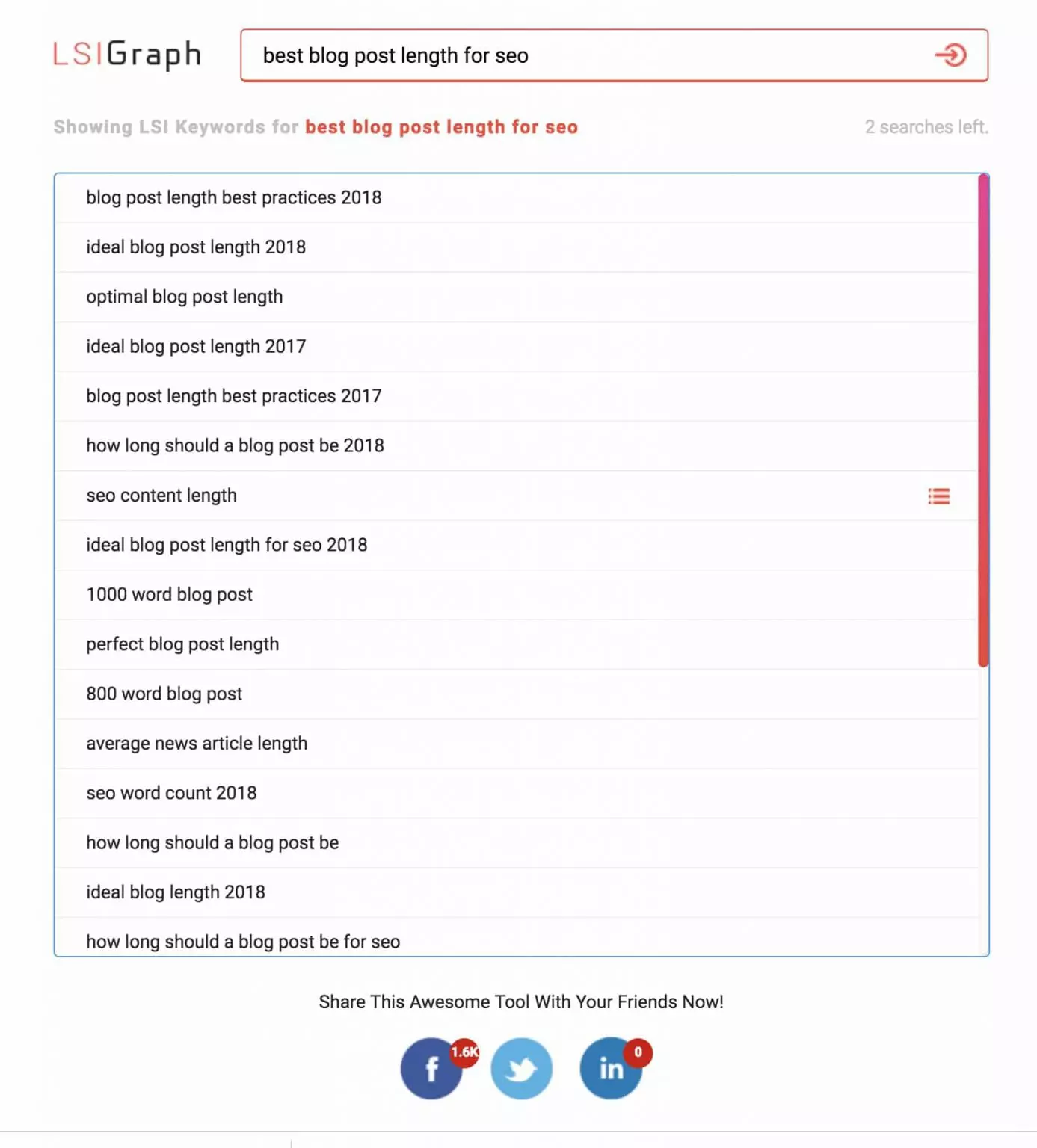Even though there is no magic number of words or length for a blog post, bloggers, SEOexperts, and contentmarketers still want to know: how long should a blog post beto help with SEO?
What Is The Ideal Length For A Blog Post?
People have probably told you things like "people's attention spans are shorter than ever" or "people only want small pieces of information."
But this doesn't mean that you should write short blog posts.
When it comes to blog posts, longer is often better.
Even though people may have shorter attention spans, the average number of words in blog posts is going up.
IsItWP says that between 2014 and 2018, the average length of a post grew by about 42%, from 800 words to 1,151 words.
The best length for a blog post is 1,600 words, according to the infographic "The Internet is a Zoo: The Ideal Length of Everything Online" from Buffer.
But some sources say that a good blog post should be even longer than that.
In a Medium article, the author says that people paid the most attention to posts that took an average of 7 minutes to read.
HubSpotlooked at this data and found that the average reading speed of adults who speak English as their first language is 300 words per minute. This means that the best length for a blog post is2,100 words.
Then HubSpot looked at their own blog posts and found that between 2,250 and 2,500 words was the sweet spot for a blog post.
As these different word counts show, the best length for a blog post depends on who you ask.
But they all agree on one thing: long-form content is king.
In fact, most blog posts written by bloggers today have more than 1000 words.
Even though it takes more time to write longer blog posts than shorter ones, there are a lot of good reasons to do so.
In the next section, we'll look at these benefits.
Anatomy Of The Perfect Blog Post
Even though it has been said that there is no one way to write a blog post, these are the things you should think about when you do.
Especially if you want to write an article with 1500 to 2500 words.
Know Your Target Audience
If you know who you're writing for, it's easier to figure out what kind of content they like.
Do they like long posts, or do they prefer short ones that get to the point?
Think about the age, gender, and expectations of your audience.
What’s Your Article’s Purpose
Before you start writing, you should ask yourself what you want the reader to learn from the article.
Most blogs are written to teach, inform, and entertain the people who read them.
This helps make the connection between your brand and your customers stronger and better.
If you know what you want your article to do, you will know how towrite it.
Choose The Right Topic
Do your research and think of topics that will be interesting and fun for your readers.
Tools like Google Keyword Planner can help you find out what keywords your target audience uses most often, and a quick search on Google using these keywords will give you an idea of what kind of content is being written about it.
If you have more time, go the extra mile and do a quick search on social mediaas well.
Check to see what kind of content is shared the most.
Captivating And Relevant Title
Try to think of creative ways to name your pieces.
Don't use common titles like "How to" and "Tips."
It's important to write a catchy title if you want people to click on your link in search results.
Also, the title of your article should describe what it is about.
Make sure that when a Google user clicks on your link, it does exactly what it says it will do.
Go With The Flow! Stop Counting The Word
Blogs are more than just words and texts.
If you feel like you've already made your point, don't force yourself to write a thousand words.
Also, don't feel like you have to stick to a certain number of words if you think there's more to say.
Focus on things that will make the experience of interacting with your brand better for your audience.
You want to make a good impression on people who visit your blog, whether they are just passing through or doing research that will lead to sales.
It works out well for both sides.
Getting Your Article To 1,760–2,400 Words - 3 Ways To Find More Points For Your Article
There are a lot of ways to add more words to a piece, but how do you do it without it sounding forced or fake?
LSI Keywords to the rescue!

Google Likes it When You Use LSI Keywords
LSI keywords are other words that are related to what you just wrote. They can help you answer questions that are related to your main topic or talk about things that are related to your main topic.
3 Ways To Find Out More About These Kinds Of Subjects
Check Out What Google Suggests When You Type A Search Into Their Box
Have you thought of everything that these "suggested searches" could mean people want to know?
You might want to add more to your post to answer some of these questions.
Using this method in this article, for example, I figured out that people might also want to know the best title length for blog articles because the question "best SEOblog title length" comes up a lot.
So, to answer your question, it's UNDER 70 characters, so that it doesn't get cut off in search results.
Use The People Also Ask Box For SEO
So now, you can see in the "people also ask" box that people are asking, "Does a blog help SEO?" and it can say a few words about that.
Because of blogging, the number of people visiting the website has gone from 100 to 200 to thousands a day, and many of those people become clients.
The idea here is that you might not have thought of all the questions people might have about what you just wrote, so look in the "people also ask" box for great questions to answer at the end of your post.
Use ‘LSI Graph’ To Increase The Length Of Your Blog Post With Useful Content
When you typed "best blog post length for SEO" into LSI Graph, you got "best practices for blog post length."
"optimal blog post length," "ideal blog post length,"
"SEO length of content,"
"A 1,000-word blog post is the ideal length for a blog post,"
and "average length of a news story."
Even though you might not always use "LSI keywords" to add things to the end of my blog posts, you can get a sense of what people really want in terms of content and maybe find other angles.
So, do you want to know what works best?
Blog Post Length – Best Practices For 2022
Always Do Keyword Research Before Starting Your Blog Post
It's a waste of time to spend a lot of time on something that no one will read, and no one wants to write more than 1,500 words without being sure that it could get 100+ people to read it and help your ideal customers in the long run.
Ahrefs.com and SemRush.com are both great tools for this.
Before You Start A Blog Post, You Should Always Think About Your "Distribution Strategy"
If your "distribution strategy" isn't SEO but instead Facebook ads, LinkedIn ads, or something else, that's fine, but you should know that before you write your epic blog post.
So, the thought process and plan for promotion can be built into the post from the start.
Average The Length Of Your Top Ten Blog Posts, And Put Most Of Your Work Into Blog Posts That Are This Length Or Longer
rather than just writing short blog posts all the time just to have something up.
Why write things that no one will read in two years?
Determine Your Distribution Strategy Before Each Blog - The Most Important Aspects Of Blogging In 2022
Even if you're not using SEO to get the blog post out there, you need to know how more than 100 people will see it.
If you don't have rabid fans who come back to your blog every day just to read your posts (which is very rare), you need to either do keyword research and really have some solid keyword targets for the article, or you need to have a lot of solid keyword targets for the article.
or you need moneyto spend on ads to get the word out.
Either way, it's too late for you to think that "if I write it, they will come." Your options are to do keyword research or spend moneyin some other way to get people to your site.
Most marketers today have a huge chance to make a lot of money if they get good at keyword research or hire us to do it for them.
If you want to get really good at one skill in 2022, keyword research is a good choice.
The Magical Ingredient? You Need To Fulfill Keyword Intent
Why do long pieces of writing work?
Comprehensiveness.
If you write a lot, it's more likely that you'll give people what they're looking for.
And the only way to do that is to figure out what the "keyword intent" is for a certain keyword and act on that.
Here's a short video showing you how to do it:

What is Keyword Intent?
People Also Ask
Should You Start A Blog In 2022?
Blogs are still very important in the year 2022.
In fact, about 409 million people use the internet every month and read about 20 billion blog pages.
Because of this, 53% of marketers say that blogging is their most important content marketingstrategy.
In addition, the number of blogs has grown by 12 percent in the last five years.
Can You Make Money Blogging In 2022?
The possibilities for blogging are almost endless.
Bloggers like Ryan Robinson, who writes a blog about blogging, can make as much as $30,000 per month if they are well-known.
Adam Enfroy started a blog about the businessof blogging in 2019 as a side job. In just two years, his blog brought in $1.5 million.
Is Longer Content Better For SEO?
Why long-form content is good for SEO.
Higher search rankings come from longer content.
Simply put, studies show that content that is longer tends to rank higher on the first page of search results.
SerpIQ did a study that looked at how long the top 10 results for search querieswere.
Conclusion
So how long should a post on a blog be?
Even though there is no one way to write a blog post, marketers should think about how valuable their article is to the people they want to reach.
By writing longer, more detailed posts, you can give readers the information they need and give your target audience more value during the research stage of the buying process, which is when they are most likely to be influenced.
Always remember that words mean nothing.
What matters is how you give the user what they want.
